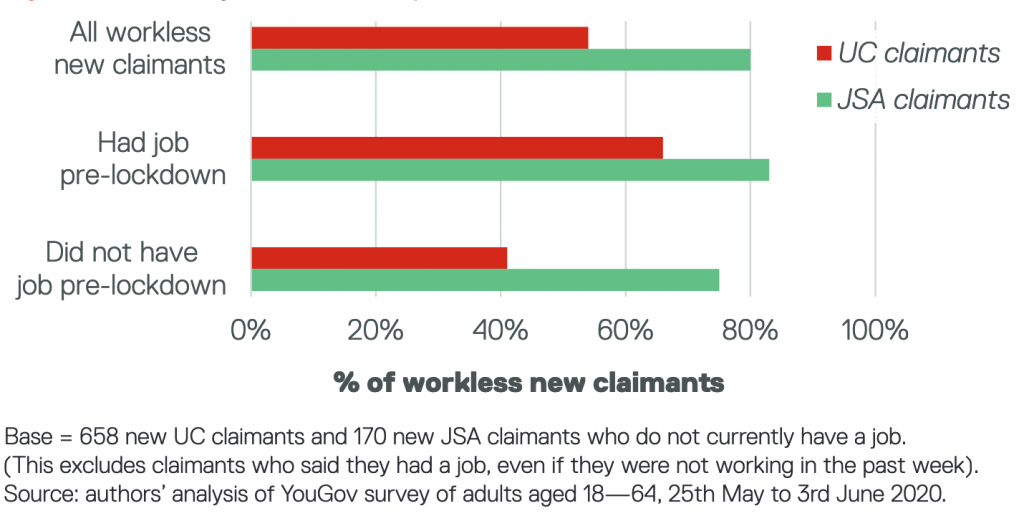The unique challenges that COVID-19 presents have meant a ‘pause’ in overt work-related requirements. Despite this, and the dire job prospects facing many, the majority of the new COVID-19 cohort of benefit claimants who do not have a job are actively looking for work, find Daniel Edmiston, Ben Baumberg Geiger, Lisa Scullion, Jo Ingold and Kate Summers. This questions many of the assumptions that underpin our increasingly conditional social security system and should encourage policymakers to rethink what income and employment support might look like as we move beyond this pandemic.
Conditionality – the linking of welfare rights to meeting particular obligations – is a significant feature of social security systems across the globe. Within the UK, successive governments have sought to increase or expand conditionality based on the belief that (overgenerous and indiscriminate) social security undermines the motivation to look for, and enter, paid work. Such a characterisation has cast increasing numbers of social security recipients – including previously exempt groups – as somehow lacking the motivation to work, and has been the starting point from which to think about how income and employment support should function.
However, in response to COVID-19, many governments have temporarily removed or relaxed the work-related conditionality inherent within their social security benefits systems. The most common response has been to increase benefit levels and extend coverage to the millions of people impacted by the virus. With this, there has been an implicit recognition that pre-existing entitlements fell short of satisfying claimant needs. Of all OECD countries, 92% have introduced income support measures for those losing their jobs or self-employment income, 84% have introduced help to deal with unforeseen care needs and 73% have made special provisions in income support for sick workers and their families.
In the UK, Chancellor of the Exchequer Rishi Sunak announced a series of measures in late March to increase social security coverage, eligibility, and generosity in the benefits system (at least for some). Leaving aside the state subsidies provided through the Coronavirus Job Retention Scheme, the social security system has become a central pillar of the government’s response to the socio-economic fall-out, with the Department for Work and Pensions (DWP) processing 3.2 million Universal Credit declarations since lockdown began.
The DWP has also suspended all work search and work-related requirements for Universal Credit and legacy benefits for an initial period of three months – work search is therefore expected but is no longer mandatory. The removal of conditionality is nonetheless extraordinary in political and policy terms, at least given what has typically been considered possible, necessary, and ideal in the British social security system over many years. In the absence of mandatory work-related activity, we have the opportunity to see whether the concerns raised by advocates of conditionality hold true.
Evidence from the UK in lockdown
Based on a survey of 2,080 new Universal Credit (UC) claimants and 297 new Jobseeker’s Allowance (JSA) claimants, our new research on the benefits system under COVID-19 challenges some of the prevailing assumptions surrounding conditionality.
Despite the suspension of mandatory job-search requirements and an extraordinary drop in job vacancies, we found that the majority of new UC claimants (54%) and new JSA claimants (81%) who do not currently have a job are looking for work. When asked, two thirds (66%) of new UC claimants who had a job before COVID-19 had looked for work in the past four weeks, compared to 41% who didn’t have a job before the lockdown. This rises to 83% of new JSA claimants who lost their job since the start of March. Overall, 59% of new UC/JSA claimants have looked for work in the past four weeks.
Figure 1: Proportion of claimants looking for work
In addition to significant numbers of people already looking for work, it was also evident that they wanted help to find work or more hours of work, with 67% of new UC/JSA claimants saying that various aspects of employment support would help them do this. Claimants tended to identify employment support measures that entailed personalised coaching such as helping them to think about what jobs they could do or improving their skills/getting training.
For new UC/JSA claimants not currently looking for work, the majority (51%) had been impacted by COVID-19 in a way that made it difficult for them to return to (full-time) work. This included: caring for children due to a lack of available schooling/childcare, requirements to self-isolate or shield, being ill with COVID-19, and being concerned about the health and safety aspect of returning and travelling to work. In addition to this, 16% were experiencing a long-term sickness or disability and 8% were undertaking a caring role for non-COVID-19-related reasons.
What should be done about this?
The social and economic impacts of COVID-19 are proving devastating for many of those who have lost their job or income. In certain respects, the DWP has responded to the scale of this challenge and altered the terms and scope of social security entitlement for many. There is an opportunity to learn from the lessons this moment presents: that the majority of benefit claimants in the UK are not currently mandated to look for work and yet they are still looking. This supports overwhelming evidence that, despite political rhetoric, benefit claimants do not lack the motivation to work.
For those not looking for work, there are clear obstacles that preclude them from fulfilling work-related requirements and job search. For many, these obstacles relate to the realities of social distancing and its impact on the wider economy. For others, there are longer-standing obstacles that will extend through and beyond this pandemic.
But this is not to say that claimants do not want support. Indeed, our survey identified a number of areas where benefit claimants would like additional assistance to help them engage (further) with the labour market. This flags up the importance of genuinely personalised support for benefit claimants that accounts for personal circumstance and fluctuating labour market conditions. This includes helping people to identify jobs that they can do but also how they might transfer their existing skills and experience to other industries.
It remains to be seen whether and how conditionality, in its previous form, will return to the social security system. Even if ‘COVID-19 social security’, introduced in March, only offers a temporary suspension of ‘business as usual’, this can still be a watershed moment in how we think about conditionality and its relationship to income and employment support. There is an opportunity to reconceive the social security system in a way that responds dynamically to the needs of those already looking for (more) work, and accounts for the short-term obstacles and longer-standing challenges for those unable to do the same.
______________________
Note: Welfare at a (Social) Distance (@DistantWelfare) is a major national research project investigating the benefits system during the coronavirus crisis, funded by the Economic and Social Research Council. For more information on the project, to sign up to our email list, or to contact us with your ideas or personal experiences please see here.
Daniel Edmiston is Lecturer in Sociology and Social Policy at the University of Leeds.
Ben Baumberg Geiger is Senior Lecturer in Sociology and Social Policy at the University of Kent.
Lisa Scullion is Professor of Social Policy at the University of Salford.
Jo Ingold is Associate Professor at the University of Leeds.
Kate Summers is Research Fellow in the Department of Methodology at the LSE.
All articles posted on this blog give the views of the author(s), and not the position of LSE British Politics and Policy, nor of the London School of Economics and Political Science. Featured image credit: by Damian Zaleski on Unsplash.









1 Comments